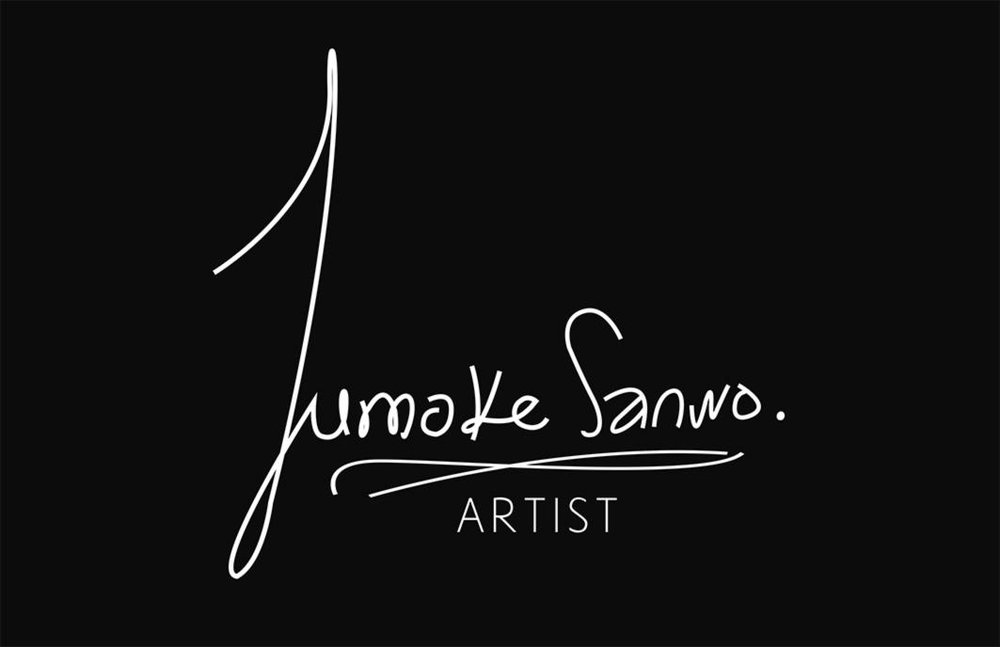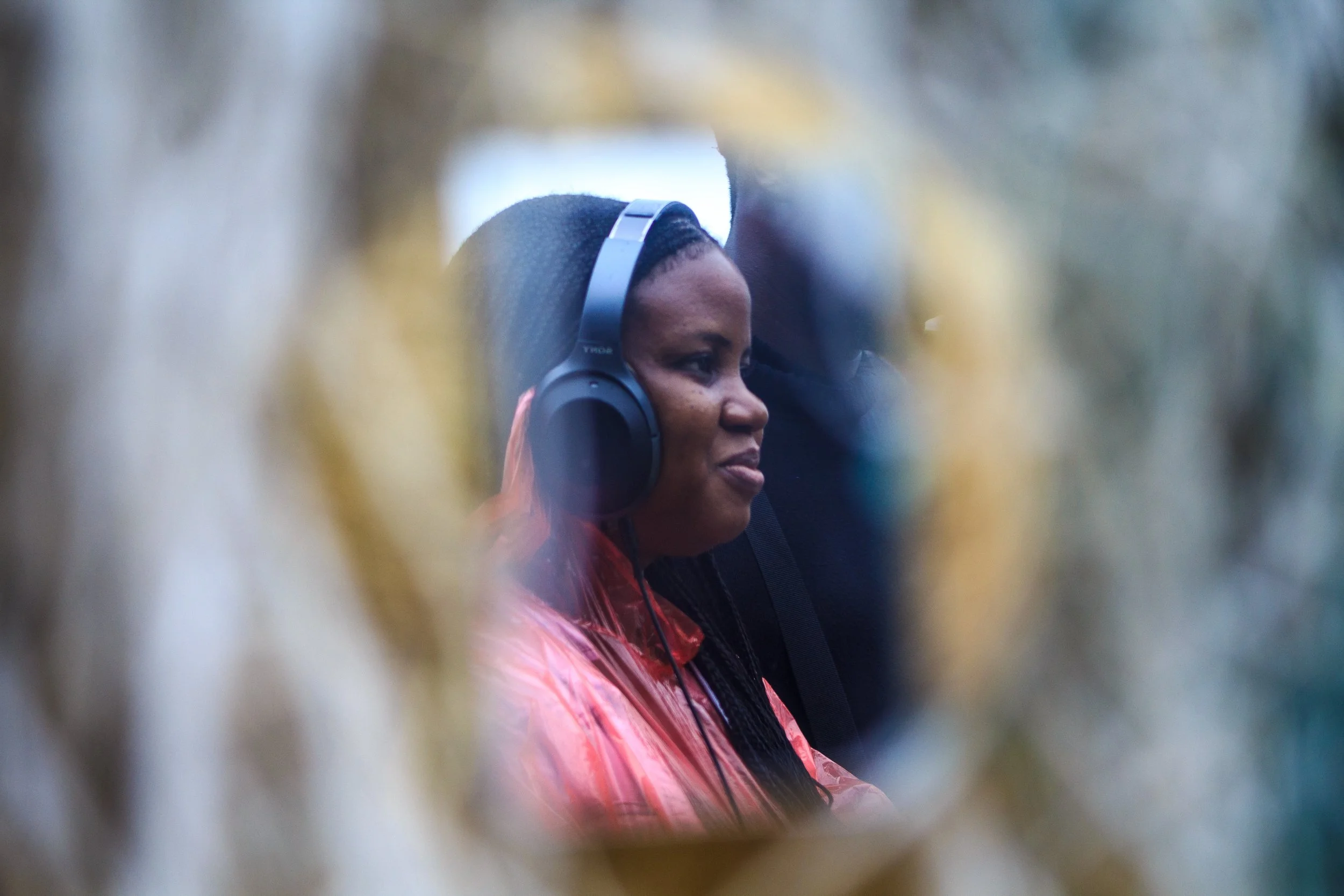Behind the scenes, Jumoke Sanwo at the Ijeh Oluwaloseyi night-market Obálendé, 9th of June 2021.
Reclaiming Public Space: The Production of Meaning
Since 2011, Jumoke Sanwo has actively engaged in "the production of meaning" through artistic and cultural production in Lagos. She critically examines the origin, legal, economic, and political forces shaping and inhibiting cultural production, exploring how these forces express existing power relations, why and by whom cultural products are created, and who consumes and appropriates them, and for what purpose. By addressing these questions, she promotes awareness of the diverse forces influencing culture and determining the effects of cultural productions. Her projects, RAI-Incubator (2016-2020) and Portal of Re-imagination- DÚNA DÚRÀ (2021), focused on reclaiming public and social spaces in Lagos to explore the complexities and effects of postcolonial realism on artistic and cultural production.
For Sanwo, reclaiming these spaces is a path towards decolonization and redefining an inclusive future for the megacity.
Curatorial Essay
Dúna Dúrà: The Portal of Re-imagination emerges from the transformative landscape of the COVID-19 pandemic, which Arundhati Roy described as "a portal, a gateway between one world and the next” Following the 2020 global lockdowns, our lives underwent a profound shift, altering how we perceive the present, navigate realities, exchange knowledge, and engage with virtual, physical and social spaces, akin to death of the old order.
In the Yoruba worldview, death is not an end but a transition to another dimension of space and time. Within this concept of transcendality, the night market serves as a portal between the corporeal and incorporeal worlds—an interstitial space where the living and the departed interact and coexist. Professor Moyo Okediji describes the night market as "Ajere-Onigba Ona," a space of "total openness" allowing movement between dimensions with multiple points of entry and departure.
This shift had a particular impact on the "global south," a region already existing within what Boaventura de Sousa Santos termed the "abyssal lines"—a space where "forgotten" indigenous knowledge systems, crucial to the lived experiences of its inhabitants, remain invisible. As Chinua Achebe suggests in his final book There Was a Country, artists are connected not only to human communities but also to those of ancestors, animals, and nature. Existing in liminal zones, artists can channel abandoned indigenous knowledge, challenge norms, and rethink our collective engagement with memory and history. Artistic and Cultural productions offer potential entry points into the complex, often erased, histories of the global south, their alternative knowledge systems, and the preservation of cultural assets. Engaging within these liminal spaces is key to creating future encounters, reimagining, and re-experiencing a society's abyssal line—shifting from "place," associated with the past, to "space," synonymous with the present and future.
On June 9, 2021, we brought together creatives, everyday people, and intellectuals in Lagos for a discourse on embodied and spatial memory. Using the Yoruba belief in the night market as a portal between the living and the dead, we staged Dúna Dúrà, a spatial intervention at the Ijeh Oluwaloseyi night market in Obálendé, situated between the Obálendé transportation hub and Ikoyi Cemetery.
This site-specific re-imagination consisted of an evening of performative encounters. It began with Èjìgbèdè, described by Àrèmo Gemini (Yusuf Àlàbí Balogun) as a "Sermon from the Dead"—a spontaneous poetry performance and "introspection into the constant visits and intercessions of the ancestors." This performance by Àrèmo Gemini prepared the space for multimedia artist Jèlílì Àtíkù’s Ẹ̀mí l'ọlọ́ọjà ara, a channeling of the market's guiding deities, Èṣù and Ajé. Àtíkù invoked these deities to intercede in acts of remembering and forgetting. His Gbanjo Gbanjo, a call for bargaining, opened a space for renegotiating histories between the global North and South.
Multimedia artist Professor Jèlílì Àtíkù performs Ẹ̀mí l'ọlọ́ọjà ara at DÚNA DÚRÀ, Ijeh Oluwaloseyi night-market, Obálendé, June 9, 2021.
Àtíkù and Gemini, acting as mediums between the corporeal and incorporeal, transformed the night market into a mystical space. Their three-part performance explored remembrance and forgetting, delving into cultural and ancestral memories through a dialogue between performers, space, and audience.
The intervention, was moderated by Obasola Bamigbola. A day prior, Bamigbola held a series of Zoom conversations to set the stage. These conversations explored themes of embodied archives, night market architecture, urban informality, and market formations with experts including Moyo Okediji, Steven Ajadi, Taibat Lawanson, and Monsuru Olalekan Muritala. Further discussions with Adeboye Martins, Oludamola Adebowale, Adun Okupe, Sola Akintunde, Idris Adewale, and Fatimoh Balogun focused on the Place and Space known as Obálendé, the cultural significance of the night market in Yoruba world view, and the Yoruba aphorism ayélojà, ojà l’ayé.
Dúna Dúrà engaged with what Henri Lefebvre termed the "third space," confronting the notion of embodied and spatial memory, its dislocation, and interdependencies. It calls for a re-examination of the methodologies underpinning recollection and archives as central to decolonizing the archives of the future.
-Jumoke Sanwo 2021
Curator, Dúna Dúrà
For more on Portal of Re-imagination- DÚNA DÚRÀ (2021), read Ellipses Journal of Creative Research Article- Quiet Conversations: December 13, 2021
Jumoke Sanwo speaks to the mirror as entangled with the trans-atlantic slave trade, and her work as curator of Dúna Dúrà - A Portal of Reimagination.
(Conversation with Jumoke Sanwo, Catalina Mejía Moreno & Huda Tayob Digital Editor-Tamara Tesoriero)


